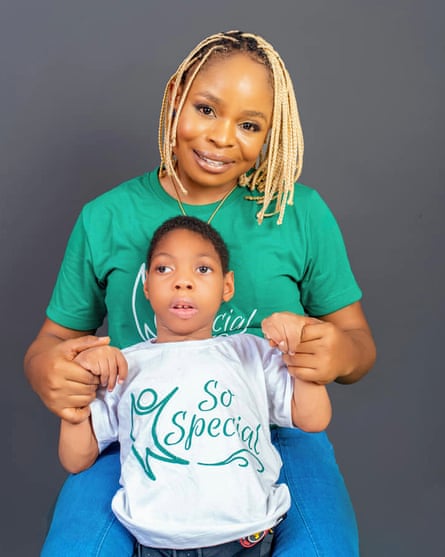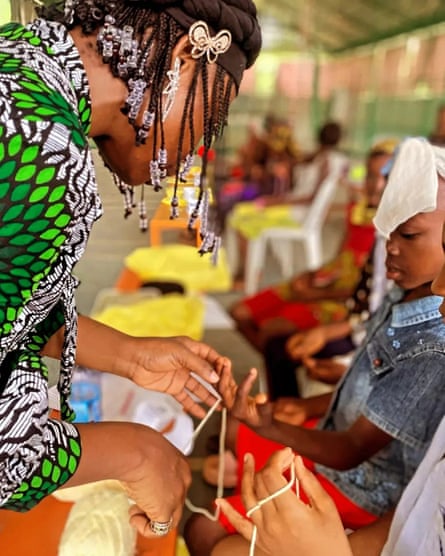Having a baby should have been the icing on the cake for Joy Eseoghene Odiete, a musician whose hit song Kuchi Kuchi was an anthem to love known across Nigeria, while her appearance on Idols West Africa had brought her a TV audience.
But her little boy was born with lissencephaly (a rare brain disorder) and cerebral palsy.
“My marriage fell apart three months later. My friends abandoned me. I was dealing with a heartbreak and my son’s health. I was so depressed and frustrated that I shaved my head completely,” says Odiete, known as Jodie.
“The doctors said my child might not live beyond two years. They said the condition had no cure and no surgery could fix it. I had to numb myself to that reality by quitting music and getting a nine-to-five job for one year to distract myself. I would often cry on my way to work in the long Lagos traffic.”
When Odiete shared images online of herself singing with her son Chinua she experienced trolling and abuse. “I’d post my baby, and people would ask what was wrong with him. Some even accused me of trying to abort him, which wasn’t true. But sharing made me feel better, so I continued. I didn’t want to hide him for ever. This is the world he’s come into, and I want people to accept him for who he is.”
That drive led her to set up the Chinua Children Care Foundation to support other families with children with special needs, and to advocate for an education and welfare system for those children.
In a society where poverty is widespread, being dependent on others is something that can be frightening and shameful, says Oluwakemi Oluwakoyode, whose daughter Oluwaponmile has cerebral palsy.
Oluwaponmile’s condition was withheld from her parents by healthcare workers who had seen how taboo and fear around disability in Nigeria had led to children being abandoned or rejected.
When doctors finally admitted that they had known all along about her child’s cerebral palsy, Oluwakayode was shocked.
“I couldn’t believe my child would be dependent on others for many things in her life,” she says.
Now aged six, Oluwaponmile, spent weeks in a coma as a baby but recovered. It was not until months later, when a doctor suggested physiotherapy for Oluwaponmile, that Oluwakayode realised that her daughter’s condition had not been fully explained to her.
Dr Iyare Osarhiemen, of Alex Ekwueme federal university teaching hospital in Ebonyi state, says withholding a diagnosis from parents for fear of scaring them is too common, although poor medical practice. “It only makes the parents anxious, and gives them false hope regarding the health of the child,” he says.

Oluwakayode had to leave her job as headteacher in a Lagos primary school to care for Oluwaponmile, who suffered frequent seizures. In her community, many believed the baby was cursed, as disabilities can be attributed to witchcraft in parts of west Africa.
“Some people advised me to kill and throw my baby away. I stopped taking public buses due to the comments and started using a taxi, despite the cost, when I took her for therapy. I was slowly sliding into depression,” Oluwakayode says.
She enrolled her daughter in a private school, but after a few days she was pressed by the management to withdraw her after some parents threatened to remove their own children if Oluwaponmile stayed in the class. “They stripped my child of her dignity. They called her an ‘imbecile’. They made me feel like having a child with special needs was something to be ashamed of,” she says.
Dr Murtala Yusuf, of the Usmanu Danfodiyo University faculty of education in Sokoto, worries that government neglect of children with disabilities contributes to the critical numbers of children out of school in Nigeria.
“There are very few special needs schools in Nigeria and those that exist are in a terrible condition – a reflection of the government’s neglect of education. They lack skilled manpower and resources,” he says.
There is no data on children in Nigeria with special needs but about 29 million people in the country live with disabilities, and across the African continent, about 95% of children with disabilities do not attend school.
Despite a 2019 law that mandates inclusive education for children with special needs, most face stigma.
Emmanuella Akinola, co-founder of Accesstech Innovation and Research Center, which provides assistive technology for the visually impaired in Nigeria, says: “The government is not living up to expectations. These laws are barely enacted. People with disabilities are not getting the right support from the government,” Akinola adds that despite several promises, the government has failed to create support systems for families of children with special needs.
The School for Special Needs Children in Osun state, established by the government in 1985, now depends on philanthropy for survival.
“Many hostels, classrooms and toilets are in disrepair. Some roofs leak and fences have collapsed. We reported the situation to the government, but no assistance has been provided,” says a teacher who wishes to remain anonymous.
after newsletter promotion
Omotoke Olugbode, an inclusion advocate, says: “This problem stems from the fact that people do not see children with special needs as part of society.”
For Oluwakayode, who now helps the Chinua foundation organise meetings featuring skill acquisition programmes, health talks, and games for parents with special needs children, the group is now her and her daughter’s family.
“I saw what Jodie did with her baby and I was inspired. I no longer hide my child and even share videos of us singing and dancing. Although we couldn’t find a school for Oluwaponmile, I bought her an interactive learning tablet. I home school her, and the rest of the family takes turns to help,” she says.

The community shares challenges and discusses strategies. Occasionally, cash donations and support equipment are distributed to families in need. Funds are provided for some to start businesses.
Many of the women now volunteer in their communities, helping others understand that children should always be seen as a blessing.
“These children may not communicate like others, but they are human beings who deserve to be loved,” says Odiete.
“Sometimes, we come together to laugh, cry and hug each other. This helps improve our mental health as caregivers to special needs children – a task which comes with diverse challenges.”
Society’s insensitivity towards children with special needs can be overwhelming, says Faith Gabriel, 50, a civil servant in Kogi state.
“One day, I prayed and asked God to take my life,” says Gabriel, who cares for her four-year-old grandson, Eleojo, who has cerebral palsy. “Most of the time, my waist and joints ache because I have to carry him everywhere,” she says.
She took custody of Eleojo from her daughter, Blessing, a university student who was abandoned by her partner who said the baby was not “normal”.
Faith, a widow, struggles financially. Her income is barely enough to feed her little family. Sometimes, she relies on loans from a local cooperative.
Last year, Gabriel shared on Facebook that she needed a medical splint to help Eleojo stand. Odiete contacted her and sent the device.
“That was how I became a member of the community,” Gabriel says. “Whenever I feel tired, I tell myself that if this woman is not tired, then I can’t be tired. I draw encouragement from her. She has given me hope to keep living. If not for her I might have given up.”
Odiete is determined to use her music to tell the stories of children with special needs and advocate for them. She says donations from kind-hearted Nigerians have been helpful, but the government and other stakeholders must provide the resources to support the children.
“Some mothers reach out to me and tell me how I’ve helped them come out of their shells and accept their babies,” she says. “One time in the market, I overheard women discussing taking their children’s lives, which is not right. Some lock their babies in a room and hope they die while they’re away. But things are gradually changing. People are now proud of their special needs children. One woman met me and said, ‘I have this child, but I can no longer lock them up. I will accept them as they are.’”
